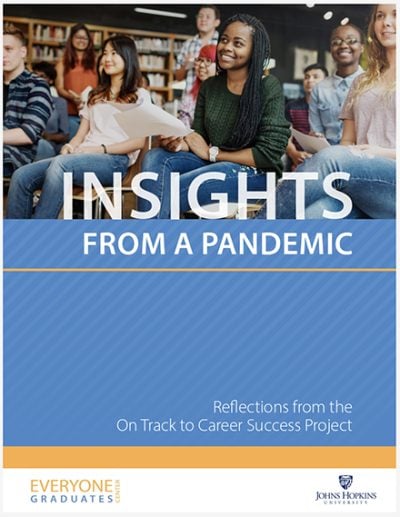Summary
On Track to Career Success, an initiative created with support from the Annie E. Casey Foundation, was implemented in schools and communities in Albuquerque, New Mexico, and New Orleans, Louisiana. Launched in 2020, the initiative is part of the Foundation’s Thrive by 25® efforts to support young adults ages 14 through 24.
The On Track to Career Success (OTCS) framework is an evidence-based model that aims to forge connections among secondary schools, postsecondary training and learning pathways and employers. Such connections can give high school students access to educational and workplace experiences and vital social-emotional support, as well as opportunities to build the skills and pathways needed to secure family-supporting wages.
This report, created by Johns Hopkins University’s Everyone Graduates Center, examines the challenges of implementing the OTCS framework during the COVID-19 pandemic.
A Three-part Framework for Youth Success
The OTCS framework is designed to intimately involve teachers, students, and local partners in the work’s creation. It is built on three foundational elements:
- Milestones, which help to identify a common set of experiences and preparations for all high school students.
- Student Success Systems, which enable school teams to monitor student progress toward those milestones and identify where additional improvement or supports are needed.
- Pathways to Career Success, which offer students viable options to transition from high school to post-secondary schooling and training in careers that provide family-supporting wages.
Implementation Insights
Program leaders gained five valuable takeaways related to implementing the OTCS framework during the COVID-19 pandemic. These are:
- schools play a critical role in connecting students and staff;
- prioritizing relationship building and people’s well-being is essential;
- flexibility is key;
- supporting productive partnerships is an ongoing process; and
- the challenges caused by the pandemic sparked rich conversations and innovation.
Next Steps and Challenges
While the OTCS framework presents students and schools with a road map to post-academic success, challenges persist. Many students in OTCS schools struggle with attendance, social-emotional challenges and academic performance. At the same time, many schools are focused on responding to the needs of the moment rather than thinking strategically or building a vision for the future.
Over the next academic year, OTCS schools in New Mexico and Louisiana will evolve the initiative by installing, implementing, and measuring student success systems. This work will include using localized, grade-level milestones and partnering with student design teams to assess and improve the approach.







